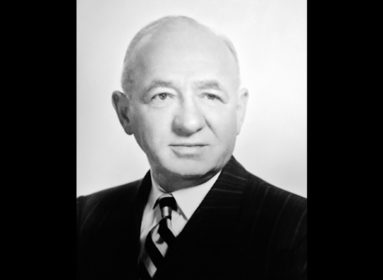DETROIT, Mich. – Columnist Jeffrey Zaslow, who writes about life transitions for The Wall Street Journal, is the author or co-author of three bestselling books: “The Last Lecture,” written with Carnegie Mellon professor Randy Pausch about the Pausch’s final lecture in 2007 before dying of pancreatic cancer in July 2008; “The Girls From Ames,” a story about the enduring friendship of a group of Iowa women; and “Highest Duty,” written with Capt. “Sully” Sullenberger, who famously landed U.S. Airways Flight 1549 in the Hudson River. Currently, Zaslow is writing “The Magic Room: The Love We Wish For Our Daughters,” due for publication in 2012.
The Ledger caught up with Zaslow at his home in Detroit to talk about his work and his upcoming appearance at the Mandell JCC in West Hartford on Thursday, Nov. 4.
Q: Tell us a bit about your Jewish background.
A: When I was in college I worked at the Jewish Exponent in Philadelphia. I was raised in a Conservative home in Philadelphia; I married a Jewish girl. We’ve lived in Detroit for 25 years and have three daughters. At my daughters’ bat mitzvahs I told them that the Jewish community will always be here for them…and if they’re not here they’ll be down in Boca, but they’ll be back in April.
Q: Is there one thing in particular that you took away from Randy Pausch’s last lecture?
A: You know, I was there that day and it was an astonishing afternoon. He was the most alive person in the room. He showed the power of embracing every moment. It wasn’t just his optimism and his attitude; it was how he was able to put his life into stories that ended up resonating with millions of people.
Q: How did you connect with him?
A: I heard about him a couple of days before he came to talk and I decided to go. So, I drove to Pittsburgh from Detroit and I wrote about it for the Wall Street Journal afterwards. We did a little four-minute highlight on the Wall Street Journal website and it took off from there. Then he decided to do a book.
Q: Do you see a connection between the lessons you learned from Pausch and the lessons you took away from your experience with the women of Ames, Iowa?
A: Yes. And my third book – the book about Captain Sullenberg – also connects with that. They’re all about the same thing – they’re all about love. The “girls from Ames” is about a love of friendship and a book on family; the book about Sully is a book about a love of flying and a love of children; and “The Last Lecture” is a book about life and about all those things. So, to me the books do completely feel connected and when I come to Hartford I’ll talk about that and I’ll explain more about how they’re connected.
Q: You’re writing a book about parents’ wishes for their daughters – are you addressing your own daughters?
A: Not really. Well, I do have three daughters, so I guess that makes me interested in the topic. I wanted to write a book about the love all of us wish for our daughters. I had to set it somewhere and so my wife suggested a bridal shop. I found a bridal shop in the middle of Michigan; in a little tiny town. The shop has been there since 1934 and it’s run by four generations of women in the same family. It’s in an old bank that went under during the Depression. In the vault, where they kept the money years ago, they put up all these mirrors and it’s a place where all the brides and their parents go to look at the dress when they put it on. They call it the “Magic Room.” So, my book is called “The Magic Room: The Love We Wish For Our Daughters.” And it’s about the parents and their daughters who have gone into that room.
Q: Do your books all emanate from something you’ve reported in the Journal?
A: No. Sully had read “The Last Lecture.” He read it on a plane – he was not flying when he read it, he was a passenger. His agent contacted me.
Q: You seem to be drawn to… you seem to be…
A: A girlie-man?
Q: Well, let’s just say you seem to be drawn to stories about women or that would appeal to women. No?
A: Well, Pausch of “The Last Lecture,” he was a pretty manly guy. Sully of course is a book with a lot of testerone.
Q: In writing a book like “The Girls From Ames,” do you feel it was a plus or a minus to be a man?
A: It was both. I asked a lot of stupid questions because I don’t really know anything about women and their friendships. So, they did a lot of eye-rolling when I was interviewing them. But then, I don’t think I was judgmental the way a woman writer might have been. She would assume “I know women; I know friendships,” and she might not have asked some of the questions that I asked because she would have assumed she knew the answers. So, in that way it’s probably a very different book than a woman would have written. It’s an outsider’s view, which is helpful.
Q: Has it impacted your relationships at all – with men or women?
A: No – though I want my daughters to have the relationships that the Ames girls have. But I have a male friend who is pretty evolved and at the end of every phone conversation he says “I love you,” and I don’t even like him anymore – it kind of gives me the willies.
Q: Any movie deals?
A: Just last week the Sully book was optioned by the producers of “Indiana Jones” – Harrison Ford helped Sully with that. We’re hoping that Sandra Bullock will play Sully. And the “Girls From Ames” is going to be a Lifetime movie – we’re hoping that Betty White will play all the girls.
For ticket information call (860) 236-4571 o








 Southern New England Jewish Ledger
Southern New England Jewish Ledger










